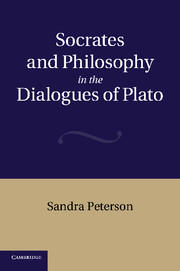Book contents
- Frontmatter
- Contents
- Acknowledgments
- Abbreviations
- Preface
- Chapter 1 Opposed hypotheses about Plato's dialogues
- Chapter 2 Socrates in the Apology
- Chapter 3 Socrates in the digression of the Theaetetus:
- Chapter 4 Socrates in the Republic, part i: speech and counter-speech
- Chapter 5 Socrates in the Republic, part ii: philosophers, forms, Glaucon, and Adeimantus
- Chapter 6 Socrates in the Phaedo: another persuasion assignment
- Chapter 7 Others' conceptions of philosophy in the Euthydemus, Lovers, and Sophist
- Chapter 8 Socrates and Plato in Plato's dialogues
- Chapter 9 Socrates and philosophy
- Bibliography
- Index of passages cited
- General index
Chapter 1 - Opposed hypotheses about Plato's dialogues
Published online by Cambridge University Press: 03 May 2011
- Frontmatter
- Contents
- Acknowledgments
- Abbreviations
- Preface
- Chapter 1 Opposed hypotheses about Plato's dialogues
- Chapter 2 Socrates in the Apology
- Chapter 3 Socrates in the digression of the Theaetetus:
- Chapter 4 Socrates in the Republic, part i: speech and counter-speech
- Chapter 5 Socrates in the Republic, part ii: philosophers, forms, Glaucon, and Adeimantus
- Chapter 6 Socrates in the Phaedo: another persuasion assignment
- Chapter 7 Others' conceptions of philosophy in the Euthydemus, Lovers, and Sophist
- Chapter 8 Socrates and Plato in Plato's dialogues
- Chapter 9 Socrates and philosophy
- Bibliography
- Index of passages cited
- General index
Summary
A DATUM: THE TWO DIFFERENT MODES OF SPEAKING OF PLATO'S SOCRATES
The Socrates of Plato's Apology, on trial for his life, announces an intention to his jurors:
While I breathe and am able, I will not stop philosophizing (philosophôn)…saying the sorts of things I usually do.
(29d)His example of what he usually says is this:
Best of men – being an Athenian, from the city the greatest and most reputed for wisdom and strength – are you not ashamed that you are concerned about having as much money as possible, and reputation and honor, while you are not concerned for (epimelê(i)) nor do you think about thoughtfulness and truth and how your soul will be the best it can be?
(29d–e)He also says:
My total concern is to be practicing nothing unjust or impious.
(32d)We can then infer that concern for “how your soul will be…best” is for Socrates concern about how to live justly and piously. So Socrates' usual address involves issuing a challenge about the rightness of your way of living.
Socrates further reports that his challenge can lead to examination and that the examination can lead to reproach under certain conditions:
And if one of you disputes this and says he is concerned, I won't directly let him off or go away, but I will question him and examine (exetasô) and test (elegxô) and if he does not seem to me to possess virtue, but says he does, I will reproach him that things that are worth the most he makes least of, but the more trivial things he makes more of. […]
- Type
- Chapter
- Information
- Socrates and Philosophy in the Dialogues of Plato , pp. 1 - 16Publisher: Cambridge University PressPrint publication year: 2011

